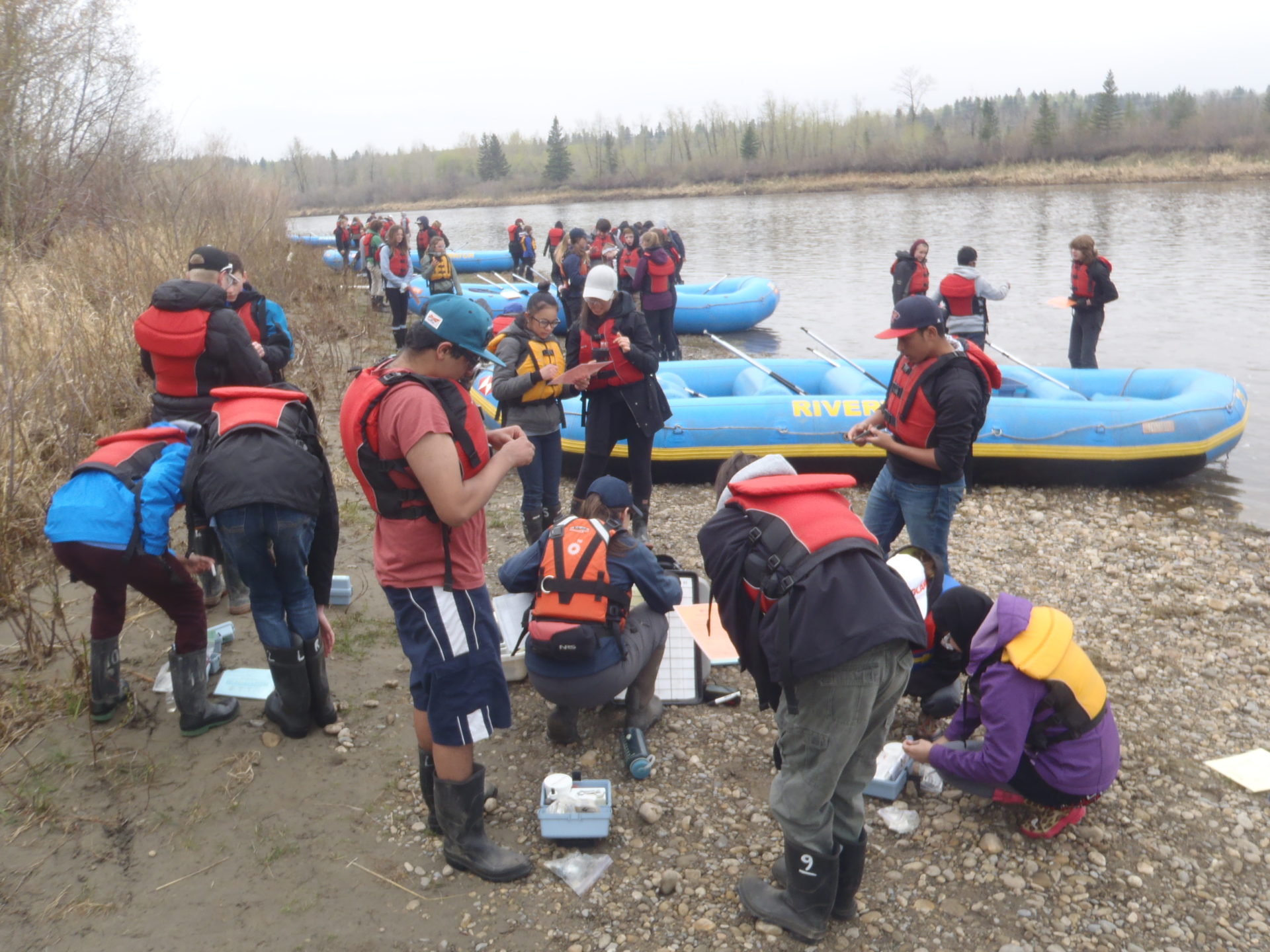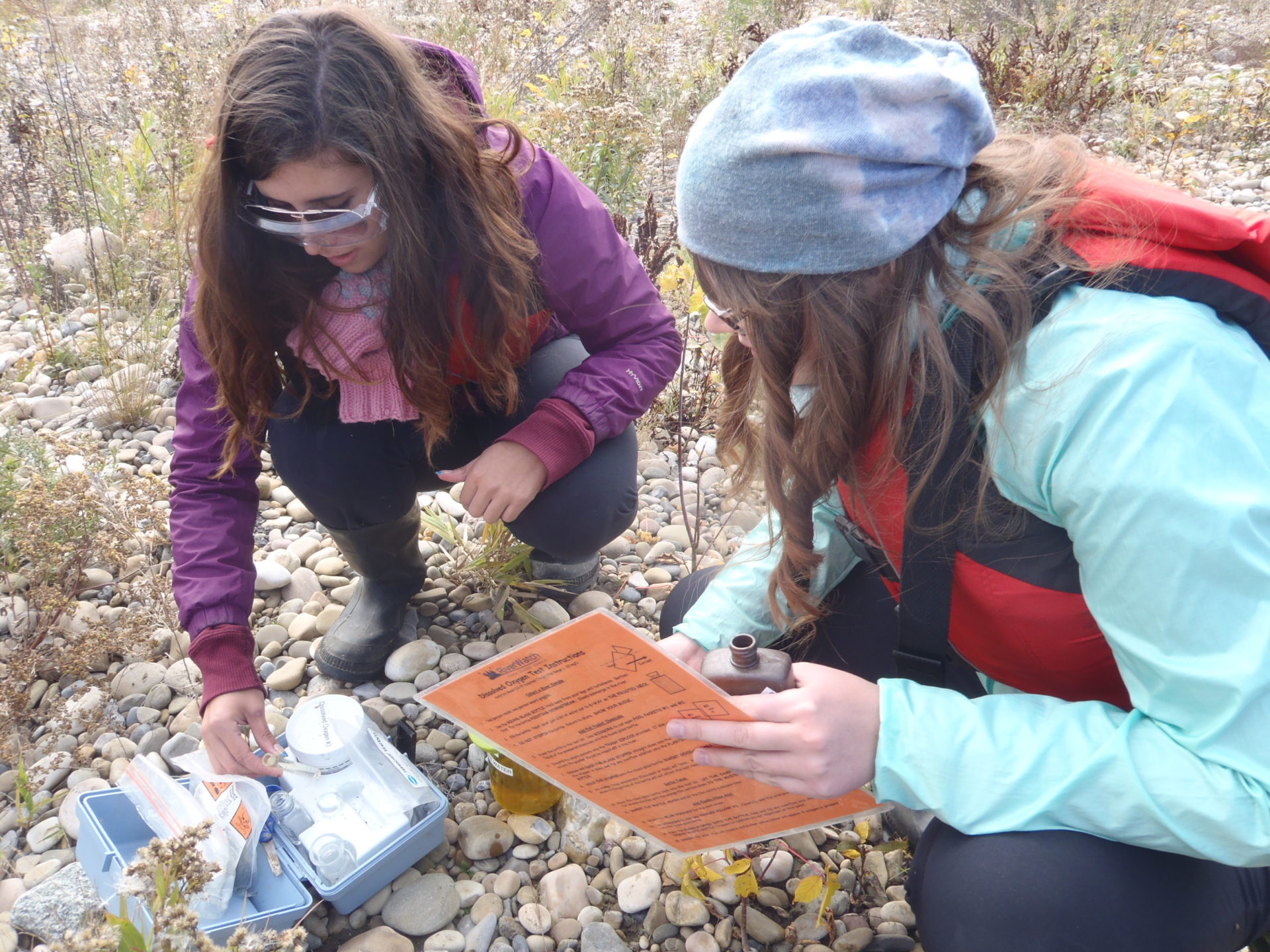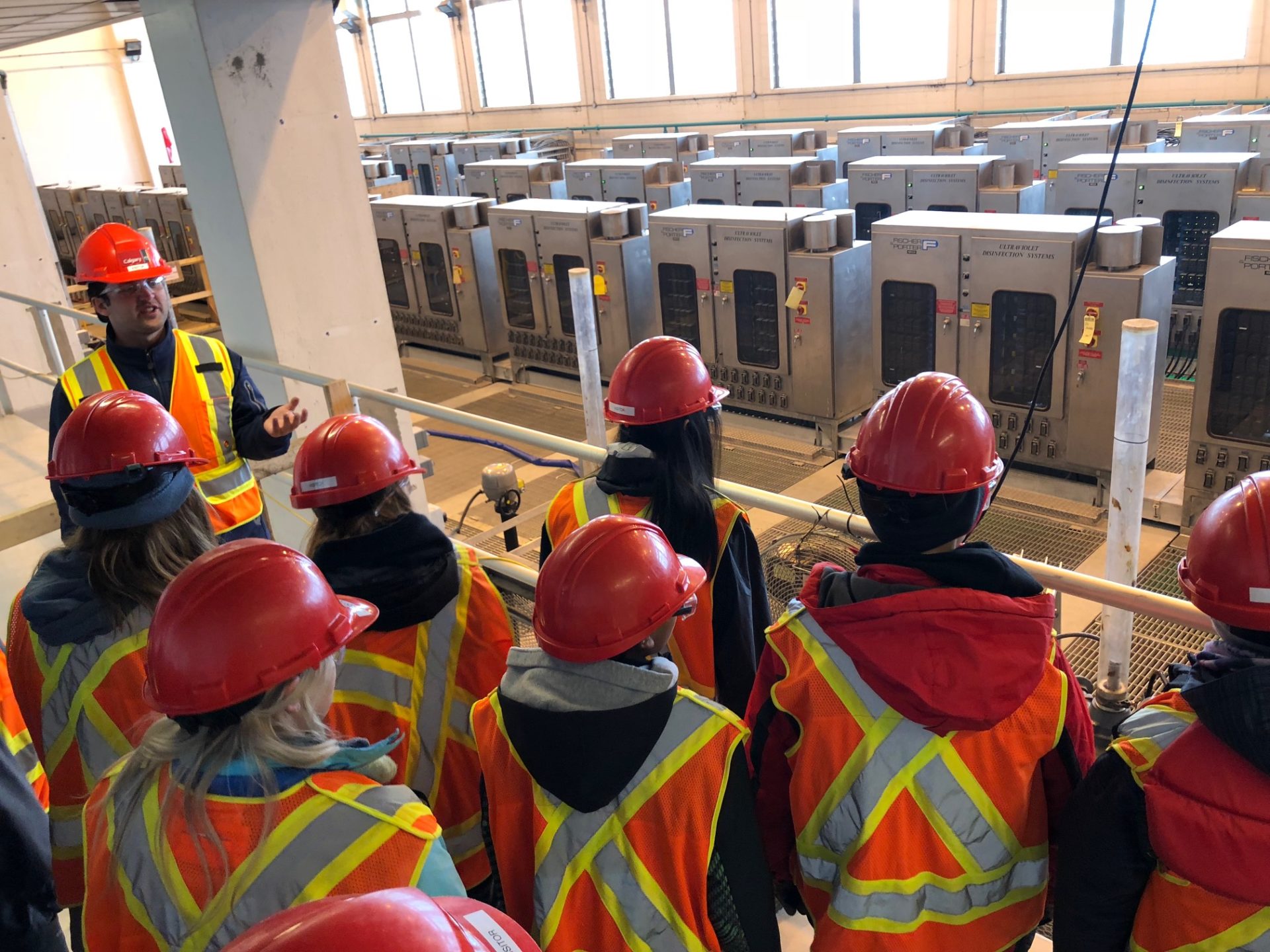Science Program
About the RiverWatch Program
What’s the best way to study a river? We think it’s by taking science classes on a float trip aboard large inflated rafts fully-equipped as floating laboratories!
RiverWatch helps secondary science students (Science 8, Science 9, Science 20 and Biology 20) to explore a section of their local river during a 10 km raft float trip. Along the way, students make shoreline stops to conduct water chemistry and biology tests above and below a wastewater treatment plant.
RiverWatch is now the most widely-used and in-depth environmental science program available to Alberta secondary schools. Since 1995, the award-winning RiverWatch Science Program has worked with more than 100,000 Alberta junior and senior high school students to promote an understanding and interest in science and the environment.
RiverWatch School Afloat Programs are used in several Alberta secondary science courses:
| Grade | Course | Unit |
|---|---|---|
| 8 | Science 8 | Freshwater Ecosystems |
| 9 | Science 9 | Environmental Chemistry |
| 11 | Biology 20 | Ecosystems & the Biosphere |
| 11 | Science 20 | Change in Living Systems |
| 12 | Science 30 | Chemistry in the Environment |
Water quality monitoring has had a long history of use by Alberta educators, and RiverWatch School Afloat makes four significant contributions to further enhance these efforts:
- Otherwise costly lab equipment is shared with participating schools
- Experienced, professional river guides provide assistance
- A rafting adventure engages each student as an active learner
- The program is backed by a data graphing site ensuring that collected data is preserved and shared
 Students make shoreline stops to conduct water chemistry testing.
Students make shoreline stops to conduct water chemistry testing.
 Students become scientists for a day while investigating river health.
Students become scientists for a day while investigating river health.
 Students tour a wastewater treatment plant when available.
Students tour a wastewater treatment plant when available.
RiverWatch bookings are in high demand across Alberta and all available dates quickly fill. Teachers book RiverWatch programs believing that hands-on experiences are an excellent way to engage students in science. RiverWatch is a must have experience for secondary science students studying environmental chemistry, freshwater ecosystems or aquatic ecology. Parents often say they never did anything like this when they were kids!
RiverWatch is a province-wide and imaginative program connecting young people with the science relevant to their local rivers. Side-by-side and interacting with professional guides aboard river rafts outfitted as mobile water quality laboratories, students work in a team environment to research and answer the question “How healthy is our river?” In order to answer that question, students learn to use ecosystem concepts, lab skills and critical analysis. School Afloat students use science as a tool in the construction of shared knowledge.
How healthy is your river? Students from many different schools collect physics, chemistry and biology data during fifty days of field research each year. The data collection has been done over many years and along the length of various rivers. The end result is a picture of overall river health and human impact in Alberta.
Students have easy access to an on-line database and they are encouraged to critique water quality, judge environmental health and address personal actions that affect water quality. As more and more students investigate their rivers first-hand, we hope they’ll be motivated to protect and manage water quality for the benefit of wildlife, safe drinking water and recreation.
The central focus of a RiverWatch School Afloat Program is the taking of water quality measurements above and below a point source of pollution such as a wastewater treatment plant. (We take our students to all the best places!) Students power the rafts and collect all the science data. Citizen science programs like RiverWatch help focus attention on the personal impact that we all have on Alberta’s water. Through the interactive and hands-on learning experiences of RiverWatch, approximately 10,000 young scientists each year are now actively engaged in learning the knowledge and skills related to river ecology, environmental monitoring, field work, data collection, wastewater treatment technology and environmental stewardship.
Students leave school in the morning and meet their raft guides at the river starting point. After receiving a safety briefing, students wear lifejackets and rubber boots to enter large inflated rafts for a river float tour. At two shoreline stops, students use science equipment to collect data on river chemistry and biology before and after a wastewater treatment plant. Changes to river chemistry and biology can be attributed to the impact of treated wastewater entering the river. The trip finishes off the water in the afternoon and students return back to school. This once-in-a-lifetime opportunity may require students to make alternate transportation and activity arrangements before or after school.
Students should not bring their school pack — no text books, laptops, sports gear, music instruments or heavy, bulky items.
- Only a very light pack is permitted for a lunch and drink.
- Litterless lunches in reusable containers are recommended as there are no garbage or compost containers along the river – we pack out what we pack in.
- Rubber boots are provided, so students must wear socks.
- Full-length pants are the best legwear to avoid being wet or chaffed by rubber boots.
- There is a chance that students may get wet and no one should bring personal items such as electronics, phones or watches.
- Wool socks are so much better than cotton during cool days.
- Shorts and t-shirts are not suitable on cool days nor during the entire month of October.
Students will become “scientists for a day” and use a variety of water quality testing kits that measure river health. The upstream test site provides baseline data (control) for analyzing the downstream impacts of treated wastewater or stormwater. A data sheet is sent back to school with the teacher for classroom follow-up and all science information is uploaded to riverwatch.ab.ca
- Temperature
- Turbidity
- pH
- Dissolved oxygen
- Phosphorus
- Nitrogen
- Insect populations
Wastewater tours are sometimes included in RiverWatch programs. These are a value-added option during RiverWatch offered within the constraints of time, availability and construction. If a wastewater tour is not available on any particular trip or day, the value of the citizen science program is not impacted.
The RiverWatch Institute of Alberta undertakes all reasonable steps to ensure that “RiverWatch Science Programs” are carried out in a safe manner and that there is not undue risk of injury or accident. The “Institute” warrants that staff are fully trained and insured and that any equipment used is deemed to be safe. RiverWatch is an urban activity with continuous adult supervision and a perfect safety record. Since starting in 1995, the RiverWatch program has worked with more than 100,000 students and there has not been any safety incident involving emergency medical response. Both the participating school board and the RiverWatch Institute carry liability insurance.
Each raft group of students is under the leadership of a certified river guide who is trained to Transport Canada standards and who is very familiar with the section of river used each day. Guides are also certified as Standard First-Aiders and carry a radio, cell phone, first-aid kit, rescue equipment and an emergency response plan. There is a guide in each raft and the school is asked to provide one additional adult per boat.
RiverWatch rafts are commercial inflatable boats with a length of 20’ and accommodate 10 – 18 students. The sections of river and routes used for RiverWatch programs are the easiest and safest possible. The rivers are generally free of obstacles or waves and the best passages are obvious. RiverWatch trips are modified or cancelled at river flow rates over 500 cubic meters per second on the North Saskatchewan River or 240 cms on the Bow River.
RiverWatch guides are in-charge of safety management to ensure everyone’s well-being. It is not necessary for students to know how to swim. Lifejackets must be worn in the rafts and along the shore. Water fighting, splashing with paddles, jumping into the river, jumping into other rafts or rock throwing is not permitted. Students wear eye goggles during chemical testing. Risks during a river study or raft float may include damage, loss, illness or serious injury related to terrain, weather, animals, plants, people, vehicles, equipment, litter, rivers and/or wastewater tours.
The general tone of the day is casual and fun. However, there are many times when careful and undivided attention is required. Students should come prepared to help and learn. Students are expected to participate in paddling rafts, conducting science measurements and all related conversations. Students must be polite, helpful and refrain from swearing, smoking, wandering off, throwing rocks, splashing, etc. Students that do not meet the educational and safety expectations of the day may be sent back to the school with no refund of fees. The school principal may follow-up with appropriate parent contact and disciplinary measures.
RiverWatch is an opportunity to experience field biology but the weather doesn’t always cooperate. On cold days, students are kept as warm as possible by using physical activity, rain coats, life jackets and picnic shelters. Trips may be modified or shortened in the event of light rain, cold or wind but usually not cancelled. Steady rain, snow, high winds and morning temperatures below 0 C are considerations that will modify, shorten or cancel a trip. Forecasts can change or be inaccurate, so as often as possible, it’s best not to make cancellation decisions too soon. Rest assured, student comfort and safety are always top priority but not every day is sunny and warm — that’s the nature of field biology!
Each raft of up to eighteen students has onboard all the science kits for collecting information on dissolved oxygen, phosphates, nitrates, pH, temperature, turbidity, bacteria and invertebrates. Certified river guides provide all the leadership, river interpretation, science instruction and group management to provide a safe and quality science experience.
Participating students finish their RiverWatch day with a better understanding of environmental monitoring and what they can do to maintain the health of rivers. Some teachers have reported that their students score up to 15% higher on related sections of provincial achievement exams. Some of our students have gone on to conduct river bank rehabilitation projects and employment as RiverWatch guides.
Some of our river guides have gone on to employment as municipal water resource staff, urban planners, science teachers, environmental researchers, international aid consultants and heli-ski lodge wastewater managers. At the same time as they are out with their students, accompanying teachers are provided with an experience and resources that contribute to their ongoing professional development and classroom work.
RiverWatch is a registered charity that operates on a user-pay and cost-recovery basis with thirty-six seasonal river guides, a business manager, an executive director and a volunteer board of directors. Operations are based in Edmonton on the North Saskatchewan River and in Calgary on the Bow River. Currently, mobile programs are also offered in Ft. McMurray, Red Deer and Drayton Valley. Operations are based at and conducted in partnership with the wastewater treatment plants in Edmonton and Calgary.
RiverWatch has been recognized with the Prime Minister’s National Award for Teaching Excellence and has been a finalist for an Alberta Emerald Award. The RiverWatch website received an Alberta E-Business Award and the organization itself was a runner-up in the Peter F. Drucker Foundation Award for Canadian Innovative Not-For-Profit Businesses. The creative work of our guides was recognized with a 2013 Honorable Mention by Interpretation Canada.
From time to time, RiverWatch receives television or newspaper coverage of our programs.
- Scientists Take Trip Down River
- A River Runs Through This Classroom
- Alberta RiverWatch Braves The North Saskatchewan River
- Taking Stock – Students Reel In Spawning Survey
- Biology Classes Take Close Look At River
Since the first RiverWatch programs were offered in 1995, more than 100,000 students from across Alberta have been participants in real-world learning along their local river. In the Big 20th Anniversary Year 2015, seating is limited to only 10,000 students — we hope you and your school are included!